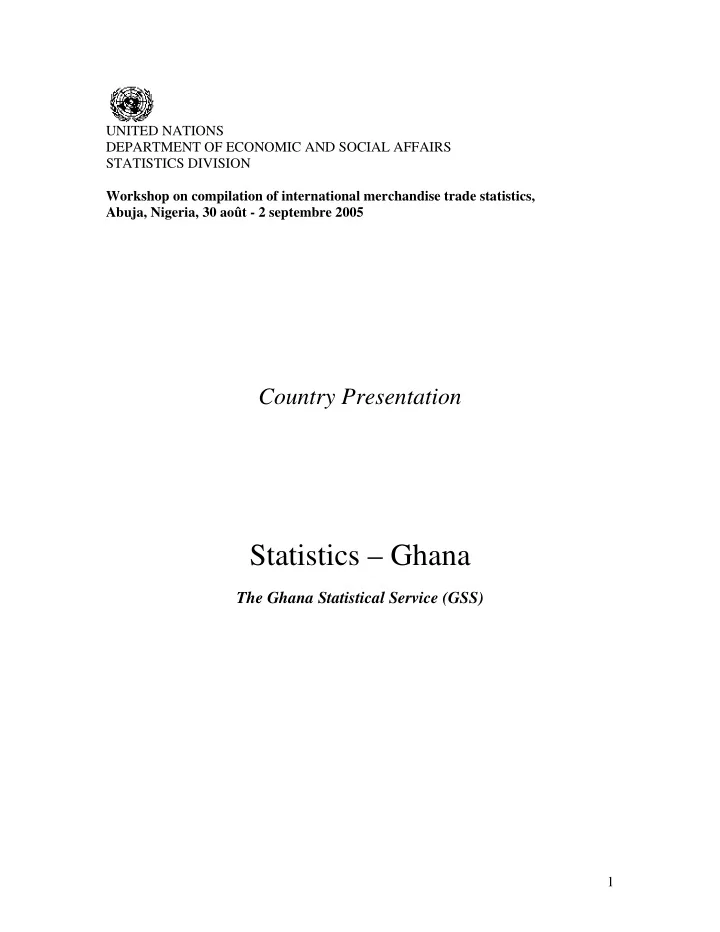

UNITED NATIONS DEPARTMENT OF ECONOMIC AND SOCIAL AFFAIRS STATISTICS DIVISION Workshop on compilation of international merchandise trade statistics, Abuja, Nigeria, 30 août - 2 septembre 2005 Country Presentation Statistics – Ghana The Ghana Statistical Service (GSS) 1
PRACTICES IN INTERNATIONAL MERCHANDISE TRADE STATISTICS IN GHANA Mandate of the Statistical Office The Ghana Statistical Service (GSS) was established by the Statistical Law (PNDC Law 135) in 1985. Until then, the office was known as the Central Bureau of Statistics (CBS) and operated as a department under the Ministry of Finance and Economic Planning. The law makes the GSS the sole governmental agency for the collection, compilation, analysis and dissemination of data in the country. It is also required to coordinate all statistical activities in the country. In exercising this mandate, the Statistical Service is divided into Divisions and further into Sections to perform the various functions of data collection. The Trade Statistics Section of the Industrial and Trade Statistics Division is responsible for the collection, analysis and publication of Merchandise Trade Statistics. Format for declarations The main source of trade data is customs declarations. The Trade Statistics Section obtains both electronic and paper declarations from the customs office. The electronic data were derived from ASYCUDA extractions while the paper declarations were for overland entry/exit points which did not have ASYCUDA installation. The ASYCUDA system was replaced by the Ghana Community Network System (GCNet) about two years. The migration was done in phases, with the International Airport being the first to migrate in December 2002. The two main seaports migrated in July 2003 and one overland port has also migrated recently. All institutions that use information from customs declarations have been connected to the GCNet so that data can be downloaded online. The introduction of the GCNet also makes it possible for companies and clearing agents to submit electronic declarations for vetting. 2
Type of trade system Ghana has since 2000 been using the general trade system in accordance with UN recommendations. Until then, the special trade system was used. The general trade system specifies what forms of transactions should be captured; that is, all goods entering the country and which would be consumed within the country. This excludes transactions between warehouses and between free zones. Such activities involve goods which have already been captured and so need not be captured a second time. Checks on data from customs The declarations from customs are first imported into a spreadsheet and checked to ensure that all the required fields have been extracted. The declarations are then transferred into Eurotrace where further checking and validation is done. Any errors detected are corrected and the data banks are updated. During the checks, if there are any blank fields, the attention of customs is drawn to it but more often than not, there is difficulty tracing the declaration forms for the corrections to be done. The blank fields are mostly for supplementary quantities. Other sources of data The other forms of data published are those for importation of crude oil and the import/export of electrical energy to neighbouring countries. The data on crude oil is obtained from the oil refinery while that for electrical energy is obtained from the institution responsible for the production of electrical energy in the country. GSS also collects some data from the Ministry of Trade and Industry on the export of non- traditional commodities. These transactions are declared on export forms and the data captured by the ministry. Data from the free zones are collected by customs. With the introduction of the Ghana Community Network, companies are able to make directly to customs, electronic declarations which are then vetted for clearance. 3
Time schedule for data processing Under the ASYCUDA regime, the electronic files were obtained from customs with a time lag of about three months. A team had to visit the various ports to do the data extraction which caused the delay. In the case of the GCNet, the data can be extracted online, but some data problems have been identified. A committee has been set up to examine the problems identified and to make a submission to the Ghana Community Network Services, operators of the GCNet for solutions to these problems. Discussion with other agencies before publication The declarations, as captured by customs are difficult to verify from another source and this is taken to be the true reflection of imports. As a result of delays in processing, the central bank often compiles some data for its balance of payments. These are verified with that of the GSS and sometimes Ministry of Trade for reconciliation before publication. A National Committee on External Trade Statistics has been formed and part of the terms of reference is to examine current methodologies used by various agencies for compiling trade data in the country. The committee is to make recommendations for a common approach to be adopted for trade data compilation. Current problems with data There are a few problems that need to be solved to enable timely trade statistics to be published. The first has to do with computer hardware. Hardware in the Section are obsolete while others are not durable (frequently breaking down). The second has to do with the data fields required from GCNet for processing. Thirdly, the windows version of the Eurotrace was successfully installed but there are some bugs that need to be removed to make the system function properly. 4
Recommend
More recommend